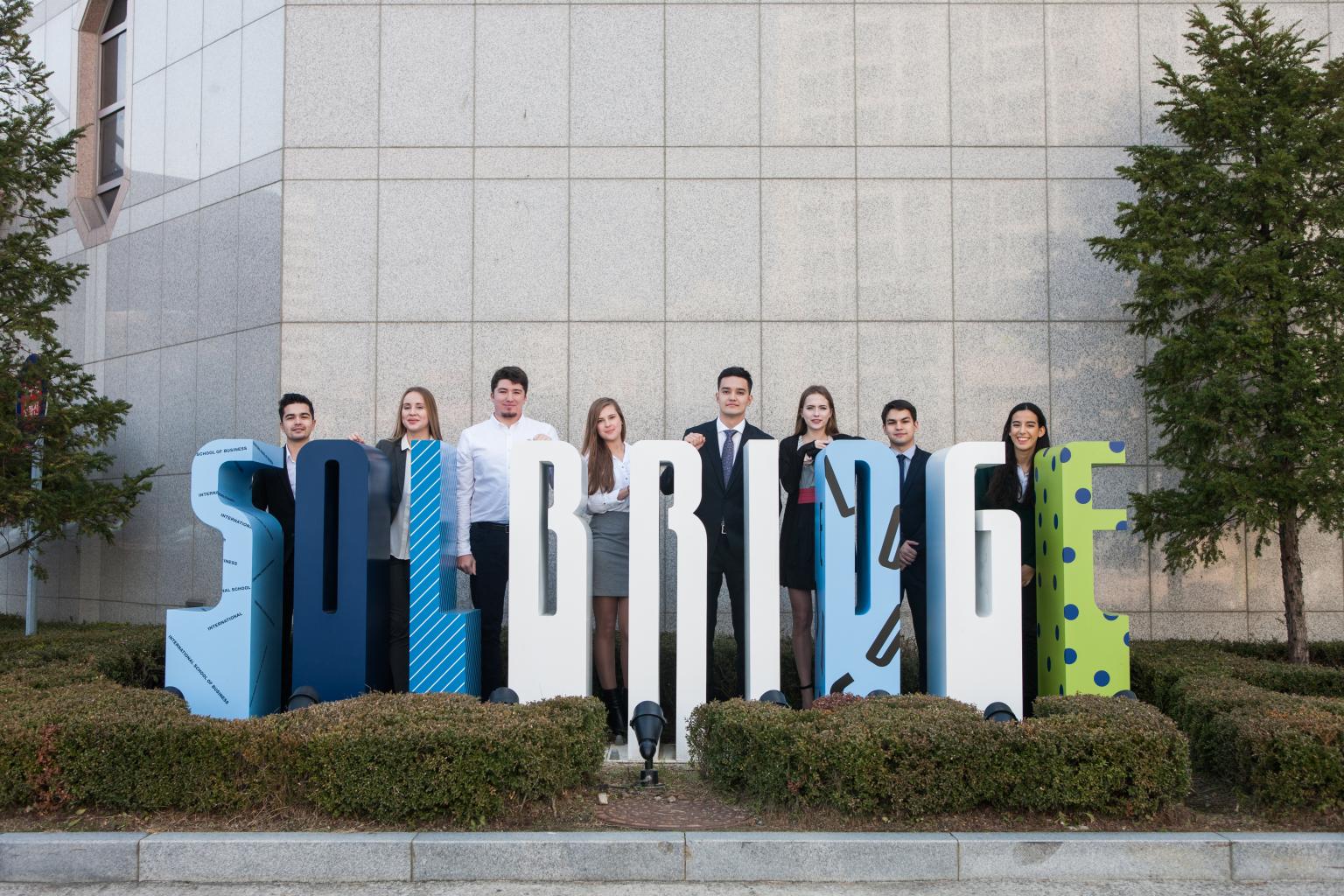 SolBridge International School of Business
SolBridge International School of Business
1,500
Number of Students
1,100
International Students
4
Number of Programs
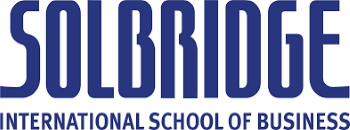
University Description:
Founded in 2007, SolBridge International School of Business is one of the rising business schools in South Korea, where all classes are taught in English. The Business School is accredited by the AACSB and offers undergraduate, graduate and MBA degree programmes in business. SolBridge’s mission is to educate the next generation of Asian thought leaders.
Term system & start dates:
Bachelor / Master: Semester
1. Term: September 2, 2024 to December 13, 2024
Application Deadline: July 1, 2024
More dates
2. Term: March, 2025 to June, 2025
1. Term: August, 2025 to December, 2025
Download documents:
Bachelor / Master: Semester
1. Term: September 2, 2024 to December 13, 2024
Application Deadline: July 1, 2024
More dates
2. Term: March, 2025 to June, 2025
1. Term: August, 2025 to December, 2025
University Facts
University Description
Founded in 2007, SolBridge International School of Business is one of the rising business schools in South Korea, where all classes are taught in English. The Business School is accredited by the AACSB and offers undergraduate, graduate and MBA degree programmes in business. SolBridge’s mission is to educate the next generation of Asian thought leaders.Bachelor / Master: Semester
1. Term: September 2, 2024 to December 13, 2024
Application Deadline: July 1, 2024
More dates
2. Term: March, 2025 to June, 2025
1. Term: August, 2025 to December, 2025
Visa Information:
Students need a D2 student visa.They can apply for a visa after completing the payment of their fees and receiving our supporting visa documents.
Students are allowed to stay in Korea until two weeks after the semester officially finishes. If they wish to stay longer, they would have to ask permission to change their visa to tourist visa. Decision is at the discretion of the Daejeon Immigration Office.
Why should you come and study with us?
Founded in 2007, SolBridge International School of Business is one the rising business schools in South Korea, where all classes are taught in English. SolBridge offers both undergraduate, graduate and MBA degree programmes in business. SolBridge’s mission is to educate the next generation of Asian thought leaders.Study opportunities:
- Bachelor of Business Administration (BBA) - 4 years- Master of Business Administration (MBA) - 1 year
- MSc in Marketing Analytics (MSMA) - 2 years
- Master in Management and Technology (MIMT) - 2 years
- MSc in Technology Entrepreneurship and Innovation (MTEI) - 2years
- PhD in Global Management - 3 years
Study abroad students can respectively take 6 courses (18 credits) at the undergraduate level or 4 courses (12 credits) at the graduate level to receive 30 ECTS.
Scholarship possibilities for international students:
Tuition scholarships are merit-based and depend on a combination of the English score (IELTS, TOEFL IBT) and the average GPA. The amount ranges from 30 up to 80%.SolBridge offers tuition scholarships for study abroad up to 50%.
Scholarships are given for the duration of one academic semester for all eligible regular and transfer
students. They are renewable if students maintain a GPA of 3.6 out of 4.5.
Internships:
Students can do an internship. If the internship is done after the study period, they would probably have to change their visa.Application Deadline:
Nomination deadline:Spring: 30 December
Fall: 30 June
Late applications:
We are flexible on a case-by-case basis, and give some extra time if necessary and if possible.
Application requirements:
- passport scan- proof of English proficiency (TOEFL, IELTS, equivalent or B2 language proficiency certificate) - a B2 DAAD certificate or an official reference letter issued by the home institution are also accepted
- grade transcripts
- two enrollment certificates
- international health certificate, if applicable
additionally for degree-seeking students:
- Bank Statement of minimum USD 20,000 or equivalent in the student's name
- a 500-word Personal Essay
- Recommendation Letter for undergraduate students; Two recommendation letters for graduate students
- Resume or CV for graduate students
- a notarized/certified English copy of the High School Dploma with apostille for undergraduate students; A notarized/certified English copy of the last unversity degree certificate with apostille for graduate students
- only official English Certificates (IELTS, TOEIC, TOEFL, Duolingo) will be accepted (no DAAD Certificate)
Orientation:
Orientation week is mandatory. It takes place in February 2021 and August 2021.Orientation week costs about USD 100 – 150, and includes meals and activities throughout the orientation week.
Examperiod:
Final exams take place at the end of the semester. Courses may include other exams depending on the course structure (mid-term exams, presentation, homework, quizzes).Working while studying:
Study abroad students will not be granted permission to work.Full degree international students are allowed to work part-time on campus up to 20 hours per week. Only degree-seeking students are allowed to work.
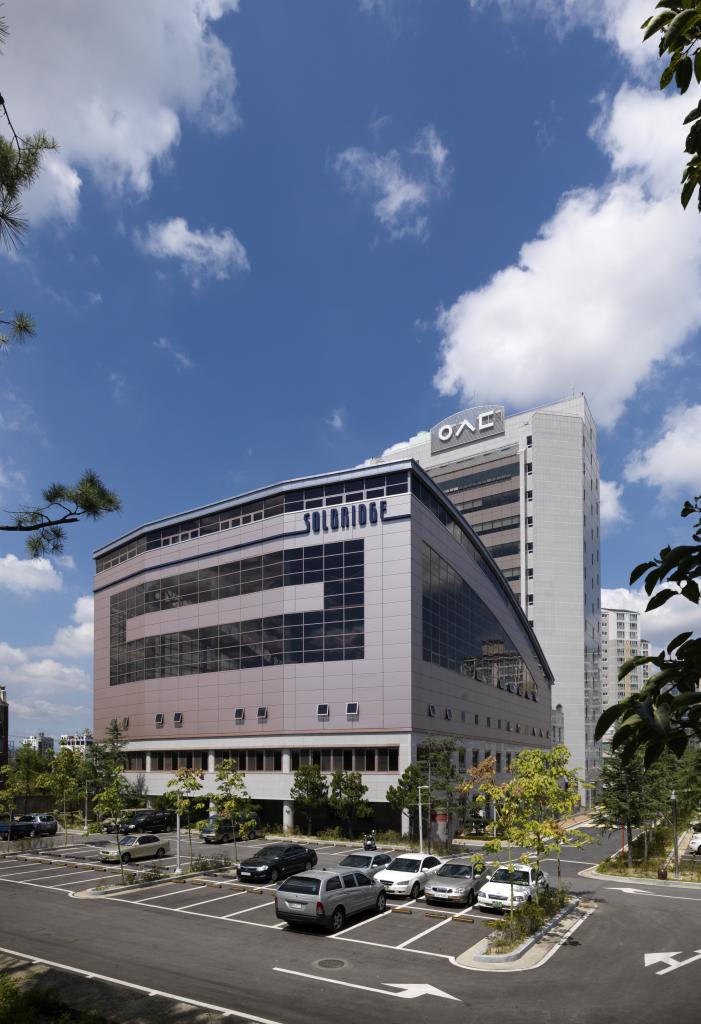
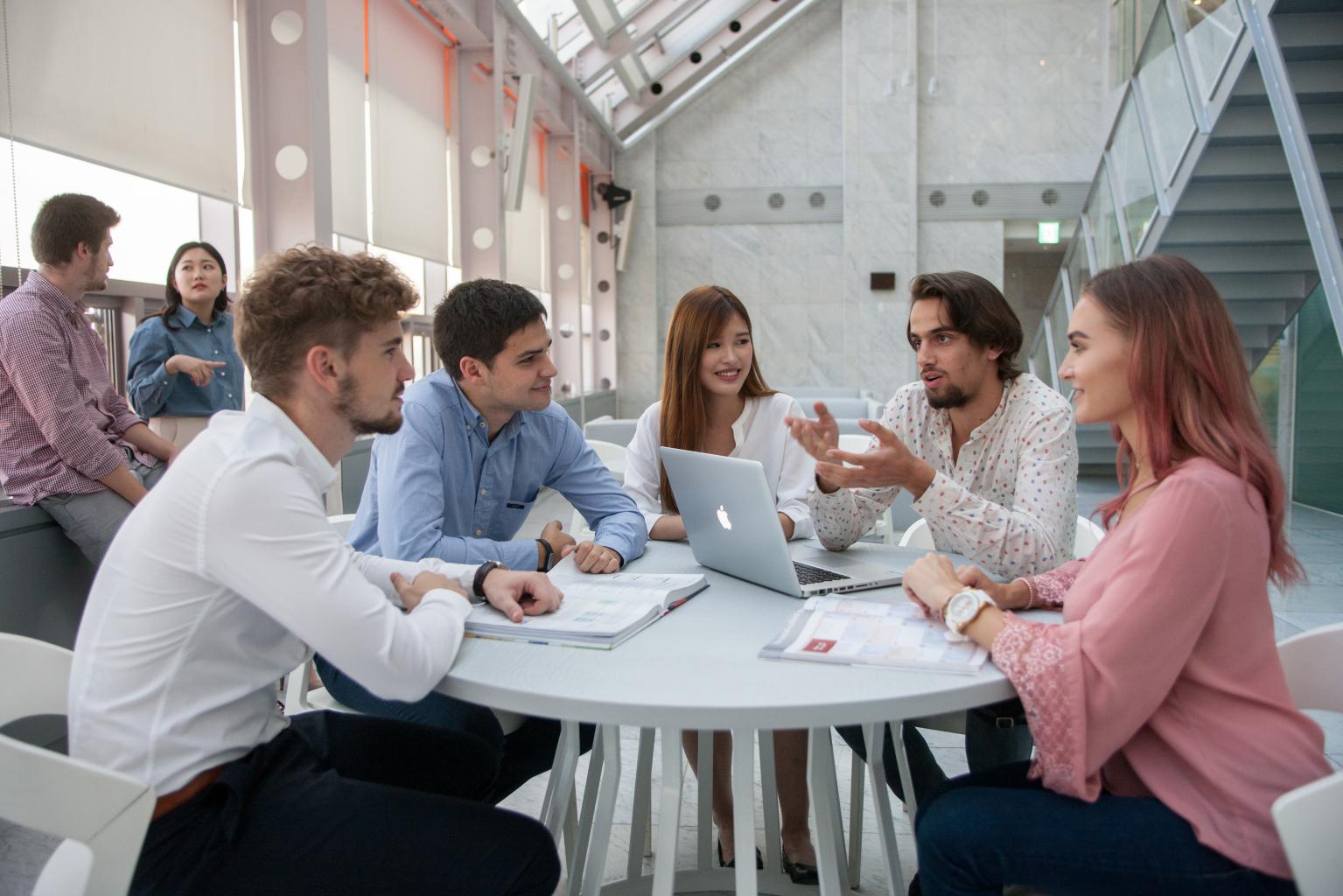
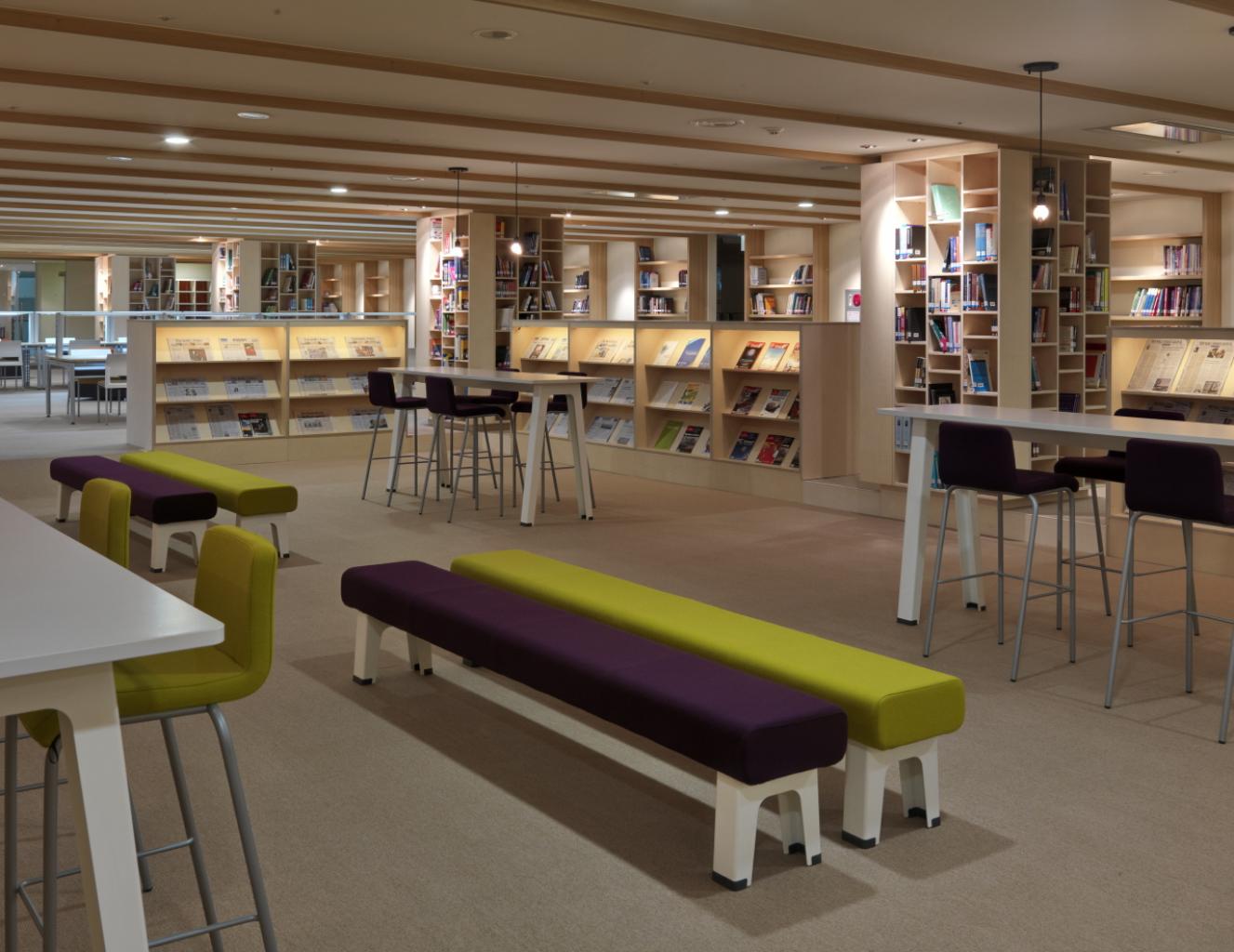

Fees
Bachelor Semester Abroad:
2,519 USD
Master Semester Abroad:
3,168 USD
Full Master:
16,700 USD to 24,000 USD
Application Fee:
50 USD
Additional Costs:
Fees, e.g. boarding, meals, orientation and the insurance may vary for +/- 70 USD in total.
Student activity: 100 USD
Orientation week: 151 USD
Medical insurance: 43 USD per semester
Enrollment fee: 650 - 700 USD (only for degree-seeking students; to be paid to the South Korean Ministry of Education)
Reductions and Scholarships:
The application fee ist waived for students from partner institutions. The listed prices further include a discount of around 50% of the original tuition fees valid for all students from partner universities.
In case you are not from a partner university of SolBridge, please make sure to apply for our scholarships to receive the reduced tution fees. To apply for the scholarship, please contact info@worldofstudents.org
Valid: 2023-06-05 to 2024-06-05
City & Living
City features:
SolBridge is located in Daejeon, 55 minutes away from Seoul by high-speed train. Daejeon is Korea’s fifth largest city and is renowned for being Korea’s Silicon Valley with about 30 research and development institutions. With a population of 1.5 million, Daejeon has the highest concentration of researchers with more than 7,000 PhD holders living and working in the city.Address in Daejeon, Korea:
SolBridge International School of Business128 Uam-ro, Samseong-dong, Dong-gu
Daejeon, Korea
Population:
1,500,000Closest Airport:
Incheon International AirportSightseeing:
Yuseong Hot Springs Public Foot Bath, Hanbat Arboretum, Daejeon O-World, Jangtaesan Natural Forest, Yurim Park, Daejeon Museum of Art, SkyroadShopping:
Daejeon Museum of ArtHow to get to university:
Students can take the high-speed train or bus from Incheon International Airport Airport to Daejeon. The ride is about 2.5 – 3 hours. The university organizes a pickup service at the airport and at the bus station in our city.Housing On-Campus:
1150 per semester - Students have the opportunity to live at our student residence during the semester. Rooms are generally double rooms with a private bathroom. The residence includes other facilities such as gym, sports field, kitchen, lounge, library. Students can also live off-campus if they wish.Housing Off-Campus:
1500 - 2000 per semester International Office has a few real estate contacts for students if they want to look for something off campus
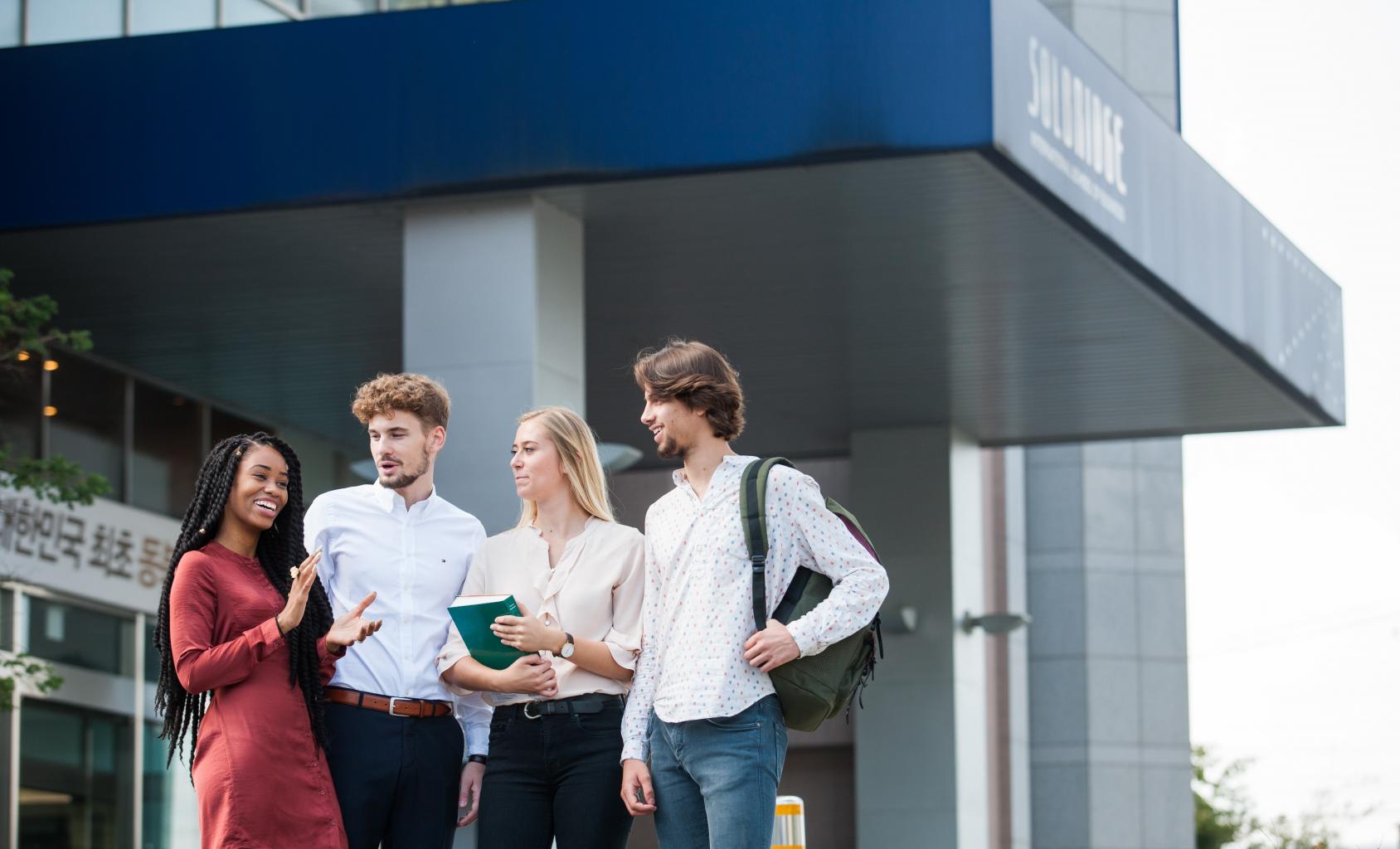

SolBridge students appointed as Honorary Ambassadors for Daejeon Metropolitan Express Transit Corporation
On Friday, September 25, 2020, Daejeon Metropolitan Rapid Transit Corporation (DJET) appointed 11 SolBridge students as honorary ambassadors. The selected students represent different countries, including; China, Ethiopia, Germany, Hungary, India, South Korea, Nigeria, Norway, Russia, and Uzbekistan.
In a ceremony held at DJET headquarters, chaired by DJET President Mr. Kim Kyung Chul and Dean Bouchikhi, the ambassadors were formally appointed and introduced to DJET operations.
The partnership with DJET, inaugurated by the signing of a Memorandum of Understanding in May 2020, is another achievement for SolBridge in its efforts to increase collaborations with industry and provide learning opportunities for its students.
Under the slogan "Think Global, Act Local," the ambassadors will provide feedback and suggest improvement to make the Daejeon subway a foreigner-friendly network. "Safety and convenience are vital to the management of the subway network; the honorary ambassadors will help us improve these critical points at the train stations," said President Kim. Input from SolBridge students will help DJET prepare for the 5,000 delegates from 140 countries, who will attend the World Federation of Local Governments meeting to be hosted by Daejeon in 2022.
Students shared their enthusiasm and excitement in participating in this project. "One of the reasons I decided to study here is the amazing technologies in Korea, and I am thrilled to be part of the initiative representing my country and SolBridge." - Leilt Assefa, Ethiopia.
In his closing remarks, Dean Hamid reminded the students of their double responsibilities of representing SolBridge and DJET as ambassadors and encouraged them to maximize their learning through this opportunity.
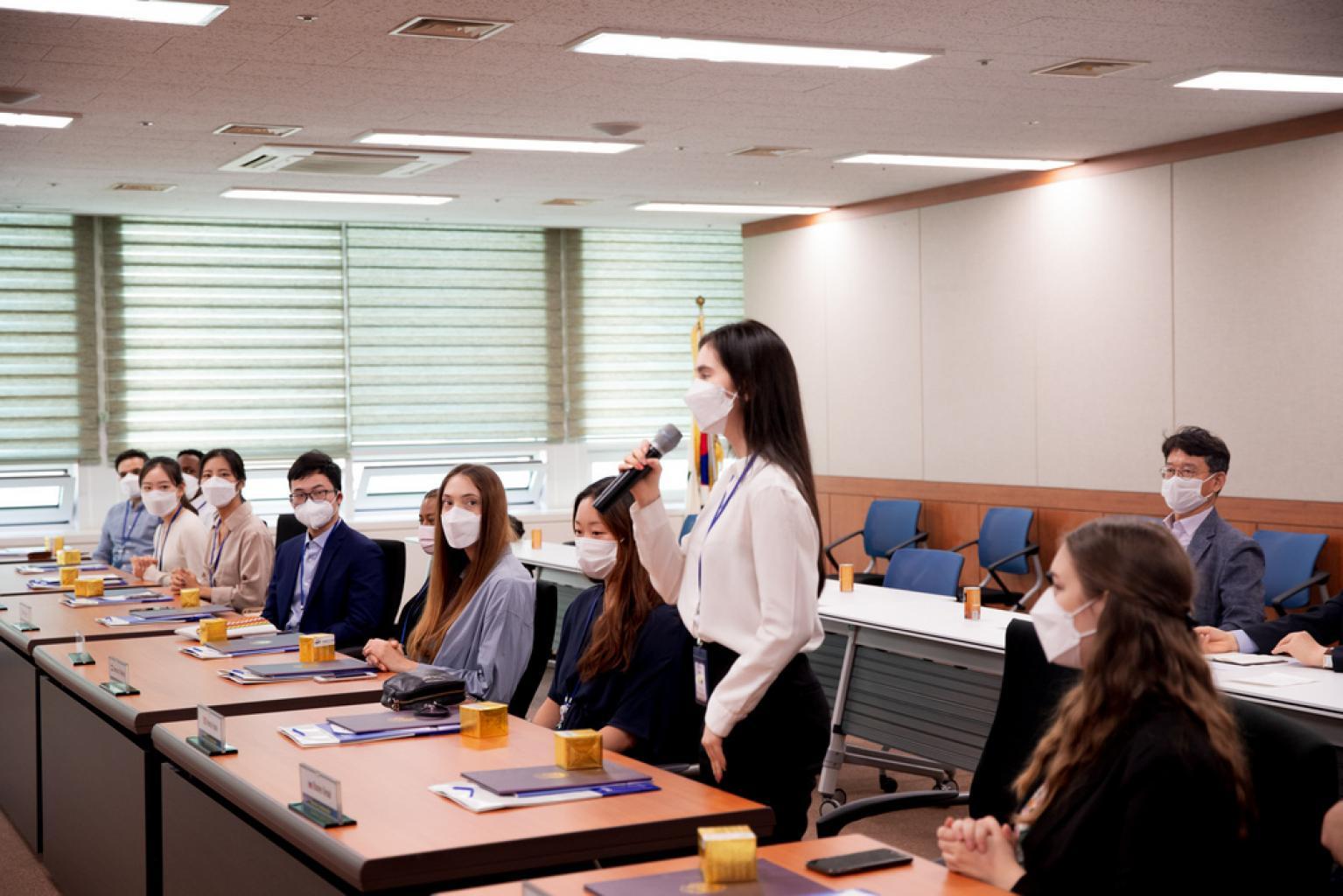
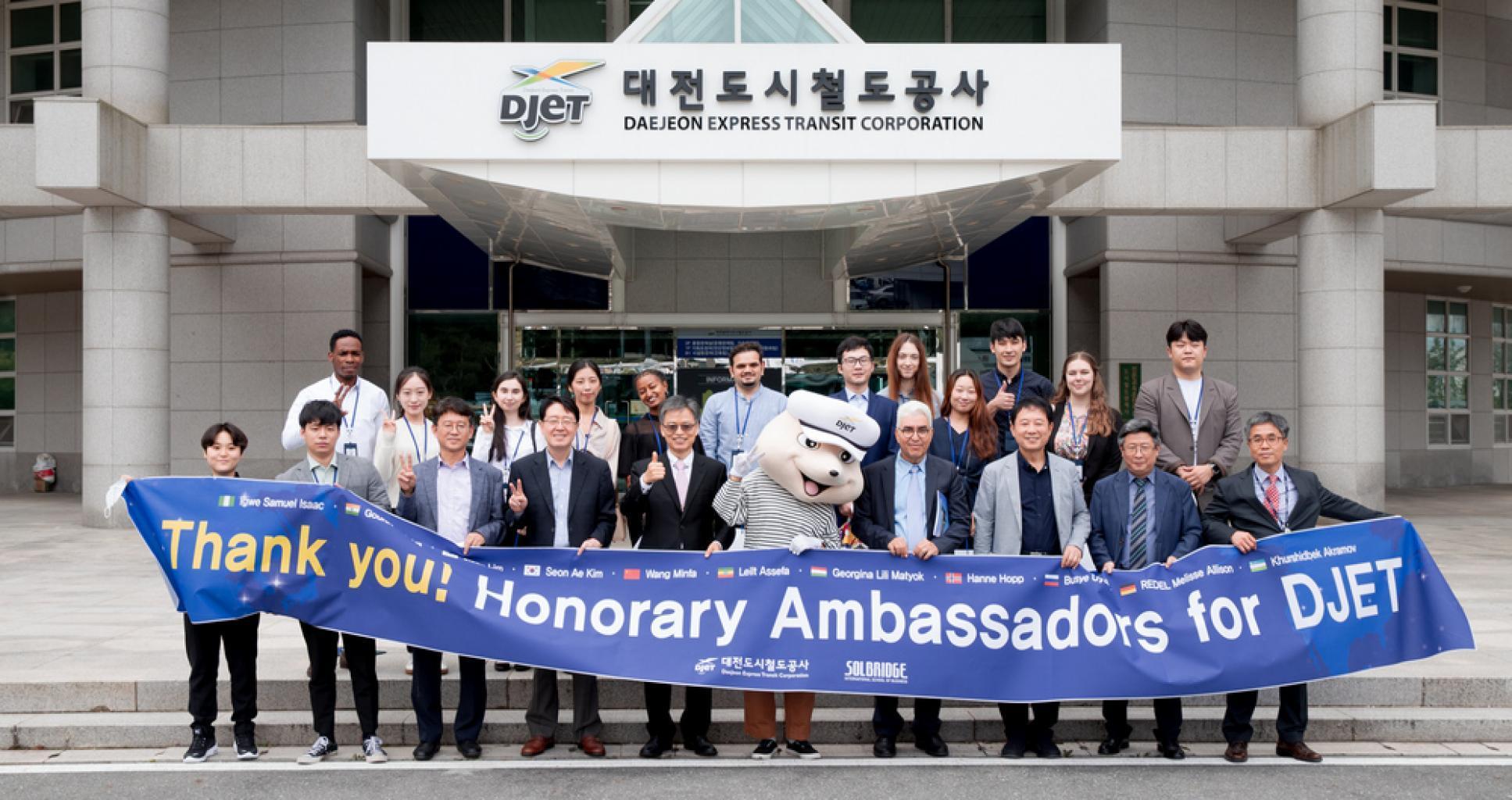
Global Start-up Boot camp at SolBridge
Effective this spring, SolBridge will run a Global start-up boot camp program for second-year and above undergraduate students interested in entrepreneurship. The program consists of five courses with 15 credit units, including; Understanding start-up Businesses, Planning and Launching Start-up Businesses, Bizthon for Start-up Business (I) & (II), and Workshop for start-up businesses.
In the 'Understanding Start-up Business' course, students will learn the business model and, using the business model, creating an IR Deck for fundraising. Students will try to create prototypes with no-coding or low-coding through market research and customer identification in the 'Planning and Launching Start-up Businesses' course. The program also includes practical training and field trips, more than simply learning the theoretical contents. Through 'Bizthon for Start-up Business,' students have the opportunity to learn and make the prototype with the help of professors and experts. On the one hand, students will have a chance to meet various Korean start-ups. The 'Workshop for Start-up Businesses' course allows students to solve problems on their own. Through this, it is intended to provide an opportunity to experience various experiences related to entrepreneurship and a general understanding of entrepreneurship.
SolBridge students can join the program by applying to Prof. SungHyuk Park, the SolBridge Entrepreneurship Center Director at sh.park@solbridge.ac.kr, by 23rd February 2021 at 6:00 pm. After a thorough evaluation, selected students will form a team to find biz items on their own and identify potential customers to understand what problems exist in the market. The program contains the process of solving problems by providing proper value to the customers. Through this process, students can be learning about various experiences and teamwork related to business.
Most Popular News:
The best time of your life - Gap Year at UNCW!
You have finished high school and don't know exactly what you want to study? The UNCW offers you a wide range of courses from over 120 fields of study - ideal for orientation after school without having to decide directly on a specific course of study. After successfully completing your gap year, you will receive your official transcript and can ideally transfer the credits you earned during your gap year to your future university in Europe - or you can decide to continue your studies in the U.S. and directly enter the second bachelor year at UNCW. So what are you waiting for? Get a taste of university life in the USA and take one step closer to your dream course of study!
Start your semester abroad in Seattle
Are you looking for the perfect spot for your study abroad semester? City University of Seattle is offering you great programs on a quarterly basis! For those of you seeking to combine studying with international experiences and company visits (e.g. Amazon, Starbucks, Microsoft, Expedia.com) we suggest to apply for our summer programs. You can join one of our two sessions and add a quarter in order to receive more than 30 ECTS in just 4,5 months! Reach out to World of Students for further information or join one of our virtual presentations.
Arriving in Canada
Before classes start, make sure to explore the vibrant city of Vancouver! Apart from the well-known tourist spots, try some of the delicious food, enjoy a bike tour through Stanley Park or watch a Majour League Soccer game of the Vancouver Whitecaps before taking the ferry or plane over to Vancouver Island to start your classes at VIU.
Fairfax Lookout in Manly
Our students love the Fairfax Lookout on the North Head!
Only a couple of minutes from the ICMS campus in Manly you can watch stunning sunsets over Sydney. At the Fairfex lookout students spend a great time together with their international friends, eating pizza and listening to music while watching the Sydney harbour. You may even see one of the whales passing by the coast.
General rating:
(4.0)Recommendation:
(3.0)University service:
(4.0)On-campus housing:
(0.0)Academic experience:
(3.0)No reviews posted yet.
Erfahrungsbericht Griffith College Dublin - by Jessi L.
Ein Semester im Ausland bietet sowohl persönlich, als auch beruflich viele neue Perspektiven und Erfahrungen. Zum einen wollte ich meine Fähigkeiten im Gebrauch der englischen Sprache verbessern und meinen Wortschatz erweitern. Aber es war mir auch wichtig mich einer solchen Herausforderung zu stellen, um selbstständiger und spontaner zu werden. Ein „normales Studentenleben“ einmal zu erleben ist gerade für einen DH Studenten sicher erstrebenswert. Da an der DH die Zeiten und Kurse sehr streng gelegt sind, bietet ein Studium im Ausland die Möglichkeit auch einmal die etwas flexiblere und eigenständigere Art des Studierens an einer „normalen“ Universität zu erfahren. Ich habe mich für das Griffith College in Dublin entschieden und diese Entscheidung auch nicht bereut. Vorbereitung des Aufenthalts Die vorläufige Anmeldung des Auslandsemesters erfolgt im Mai des Jahres vor dem geplanten Semester im Ausland. Bis zur endgültigen Anmeldung bleibt jedoch Zeit bis Herbst. Am besten informiert man sich im Voraus auf der Website des Auslandamts der DHBW und schaut sich die Website des Griffith Colleges einmal an. Zudem hatte ich einen Termin mit einer Mitarbeiterin des Auslandsamts, welche mir sehr dabei geholfen hat die richtige Uni im Ausland zu finden. Außerdem hat sie mir viele wichtige Informationen bezüglich des Anmeldeverfahrens und benötigter Dokumente gegeben. Bei Fragen während des Bewerbungsprozesses konnte ich mich auch immer an Florian Burkhardt wenden. Er ist der „German Office Manager“ des Griffith College in Deutschland und kümmert sich gerne und schnell um die Anliegen der zukünftigen Studenten. 2 Eines der benötigten Dokumente zur Vorbereitung ist das Learning Agreement. Dieses wird zwischen dir und der DH abgeschlossen. Hierbei geht es darum im Voraus zu schauen welche der Kurse, die man in Deutschland verpasst, man mit welchen Kursen am Griffith College abdecken kann. Das Learning Agreement hilft also vor Ort bei der Kurswahl und ist eine Sicherheit, dass die Kurse im Ausland auch an der DH angerechnet werden. Im Bereich BWL- DLM ist Herr Prof. Dr. Augenstein für das Agreement verantwortlich und hilft gerne bei Fragen. Eine Liste mit den in Dublin angebotenen Kursen kommt allerdings erst nach der endgültigen Anmeldung am Griffith College. Allerdings ist es gerade für den Studiengang BWL- DLM immer recht einfach alle Kurse abzudecken und oftmals bleibt sogar noch eine Wahlmöglichkeit. Ebenfalls zur Vorbereitung des Semesters in Irland gehört auch die Wohnungssuche. Hier gibt es generell zwei Möglichkeiten: ein Zimmer im Studentenwohnheim auf dem Campus oder eine private Bleibe. Insgesamt muss man mit recht hohen Mieten im Vergleich zu Deutschland rechnen. Ich habe mich für eine private Bleibe in Dublin entschieden. Hierbei war mir besonders die Website www.daft.ie behilflich. Hierzu gibt es aber auch viele Tipps auf der Website des Colleges. Wenn man diesen Weg wählt ist es wichtig noch keine Verträge von Deutschland aus zu unterschreiben oder gar Zahlungen im Voraus zu leisten. Da Dublin sehr international ist, suchen viele Leute aus dem Ausland Wohnungen, was leider auch Missbrauch und Betrug mit sich bringt. In Irland ist es allerdings so, dass man, schnell Wohnungen und Zimmer anschauen kann und, wenn man eine Zusage hat, innerhalb von 24h auch dort einziehen kann. Viele Iren und Irinnen die alleine in Häusern oder großen Wohnungen leben vermieten dort ein Zimmer unter und man lebt sozusagen in einer WG. So habe ich auch bei einer netten älteren irischen Dame gewohnt, mit der ich mich sehr gut verstanden habe und die mir auch einmal ausgeholfen hat, wenn ich Tipps oder gar ein Auto brauchte.
Mein Auslandsjahr am Griffith College in Dublin, Irland - by Jonas R.
Irland bietet viele tolle Landschaften und eine Menge an Aktivitäten in und um Dublin. Die Stadt kann man meiner Meinung nach am besten zu Fuß erkunden. Besonders sehenswert in Dublin und ganz Irland fand ich die Grafton Street Area, den Phoenix Park, die Cliffs of Moher, den Wild Atlantic Way, den Giants Causeway und den Ring of Kerry. Etwas kleinere Ausflüge von Dublin aus können z. B. nach Howth oder Dun Laoghaire unternommen werden. Außerdem gibt es einen sehr schönen Cliffwalk zwischen Brey und Greystones. Oder man macht einen Ausflug zum Strand der Dublin Bay bei Sandymount. Von dort aus kann man auch zum Poolbeg Leuchtturm spazieren. Griffith College Das College liegt im Süden von Dublin, ungefähr 20 bis 25 Minuten zu Fuß vom Stadtkern entfernt. Eine Bushaltestelle befindet sich in direkter Nähe zum College. Ich persönlich rate allen Studierenden, die Einführungsveranstaltungen zu Beginn des Semesters zu besuchen. Hier werden wichtige Informationen zum Studienalltag, zum College selbst und zum Leben in Dublin weitergegeben. Das International Office klärt die Incoming Students zudem über die Beantragung der sogenannten PPS Number auf. Diese muss beantragt werden, wenn man einen Abschluss von einem College in Irland erhalten möchte (IB). Man braucht diese allerdings auch, wenn man sich vor Ort einen Nebenjob suchen möchte. Über die beiden Semester belegt man insgesamt drei Hauptfächer, das semesterübergreifende Modul „Business Plan“, sowie zwei Wahlfächer pro Semester. In den ersten beiden Wochen je Semester hat man die Möglichkeit, alle Vorlesungen der Wahlfächer zu besuchen. Spätestens nach diesen beiden Wochen muss man sich dann für zwei Module entscheiden. Was hierbei sehr schade war: es werden leider nicht alle Kurse angeboten, die anfangs bei der Bewerbung im Modulhandbuch zur Auswahl standen. In meinem zweiten Semester z. B. waren viele Studierende mit dem Fächerangebot unzufrieden. Auf Anfrage und Bitte wurde aber ein Kurs dann doch noch angeboten und eine Dozentin dafür organisiert. Bei solchen Angelegenheiten ist das College sehr verständnisvoll und bemüht. Die Studienweise in Irland ist anders im Vergleich zu Deutschland. Angefangen bei wöchentlich längeren Vorlesungszeiten (vier Stunden für Hauptfächer, drei Stunden für Wahlfächer und eine Stunde Tutorium in jedem Fach) über einen höheren Aufwand unter dem Semester (Assignments in jedem Fach) bis hin zu dreistündigen Prüfungen (essay style) am Semesterende. Die Hausarbeiten stellten zu Beginn eine große Herausforderung dar, da wir solche nie zuvor an der Hochschule Landshut schreiben mussten. Hierbei ist ein gutes Zeitmanagement wichtig. Mit der Zeit lernt man aber, worauf es ankommt und wie man die Recherchen besser angeht. Die Prüfungen sind meiner Meinung nach gut machbar, wenn man die Vorlesungen und Tutorien regelmäßig besucht. Man weiß dann, worauf es den Dozenten ankommt. Skripte werden gebunden ausgeteilt und den Vorlesungsstoff findet man zudem auf der Online-Plattform Moodle. Die meisten Professoren haben den Stoff in der letzten Vorlesung noch eingegrenzt. In der Prüfung werden sechs offene Fragen gestellt, von denen man vier in drei Stunden beantworten muss. Die Antwort wird in Form von Aufsätzen verlangt. In den meisten Fächern setzt sich die Endnote aus 60% Prüfungsnote und 40% Assignmentnote zusammen. Alternativ gibt es noch die Gewichtungen 80%/20% und 50%/50%. In einigen Fächern wird zusätzlich eine Präsentation der Hausarbeit verlangt. Der Business Plan kann an der Hochschule Landshut als Bachelorarbeit angerechnet werden. Hierbei setzt man eine Geschäftsidee um und gründet ein fiktives Start-up Unternehmen. Diese Aufgabe erschien am Anfang aussichtslos und sehr aufwändig. Dass es viel Aufwand ist kann ich bestätigen, aber wenn man seine Zeit gut plant und kontinuierlich daran arbeitet kommt man gut damit klar. Als erstes reicht man einen Vorschlag zur Geschäftsidee ein. Daraufhin werden den Studierenden sogenannte Supervisor zugeteilt. Da diese aus unterschiedlichen Bereichen kommen, hatten sie auch jeweils andere Anforderungen und Erwartungen, was schließlich auch manchmal zu gefühlt unfairen Bewertungen führte. Mein Supervisor war sehr kompetent und hilfsbereit – andere Studierende hatten nicht so viel Glück und wurden weniger unterstützt. Ich persönlich fand es besonders hilfreich, dass man in mehreren Etappen einzelne Entwürfe einreicht, die dann korrigiert werden. So hat man mehrere Deadlines einzuhalten und der Aufwand wird über das Jahr hinweg verteilt. Durch das Feedback kann man die Entwürfe verbessern und weiter ausbauen und dann im Enddokument verwenden. Jedes Semester gibt es die sogenannte Readingweek welche zum Schreiben von Assignments genutzt werden kann. In dieser Woche finden keine Vorlesungen oder Tutorien statt. Falls man diese extra Zeit nicht benötigt um Hausarbeiten zu schreiben, kann man sie gut für Besuche oder Reisen nutzen.
Strapazen, Schloss und Strand: Erste Eindrücke Auslandssemester - by Jessi L.
Full content of: Improvement suggestions/Feedback, What did you enjoy most?, How were your classes?, Were you satisfied with the organization of your study abroad term? Full content of: Improvement suggestions/Feedback, What did you enjoy most?, How were your classes?, Were you satisfied with the organization of your study abroad term?
Strapazen, Schloss und Strand: Erste Eindrücke Auslandssemester - by Jessi L.
Full content of: Improvement suggestions/Feedback, What did you enjoy most?, How were your classes?, Were you satisfied with the organization of your study abroad term? Full content of: Improvement suggestions/Feedback, What did you enjoy most?, How were your classes?, Were you satisfied with the organization of your study abroad term?
Strapazen, Schloss und Strand: Erste Eindrücke Auslandssemester - by Jessi L.
Full content of: Improvement suggestions/Feedback, What did you enjoy most?, How were your classes?, Were you satisfied with the organization of your study abroad term? Full content of: Improvement suggestions/Feedback, What did you enjoy most?, How were your classes?, Were you satisfied with the organization of your study abroad term?
Schloss, Strapazen und Strand: Erste Eindrücke Auslandssemester - by Jessi L.
Full content of: Improvement suggestions/Feedback, What did you enjoy most?, How were your classes?, Were you satisfied with the organization of your study abroad term? Full content of: Improvement suggestions/Feedback, What did you enjoy most?, How were your classes?, Were you satisfied with the organization of your study abroad term?
Free & non-binding
Arrange consultation
We would also be happy to advise you personally at:
+ 49 (0) 6151 6274 8213
Are you dreaming of studying abroad? Our team will be happy to advise you on your study options free of charge and without obligation. Request information now or contact us.

